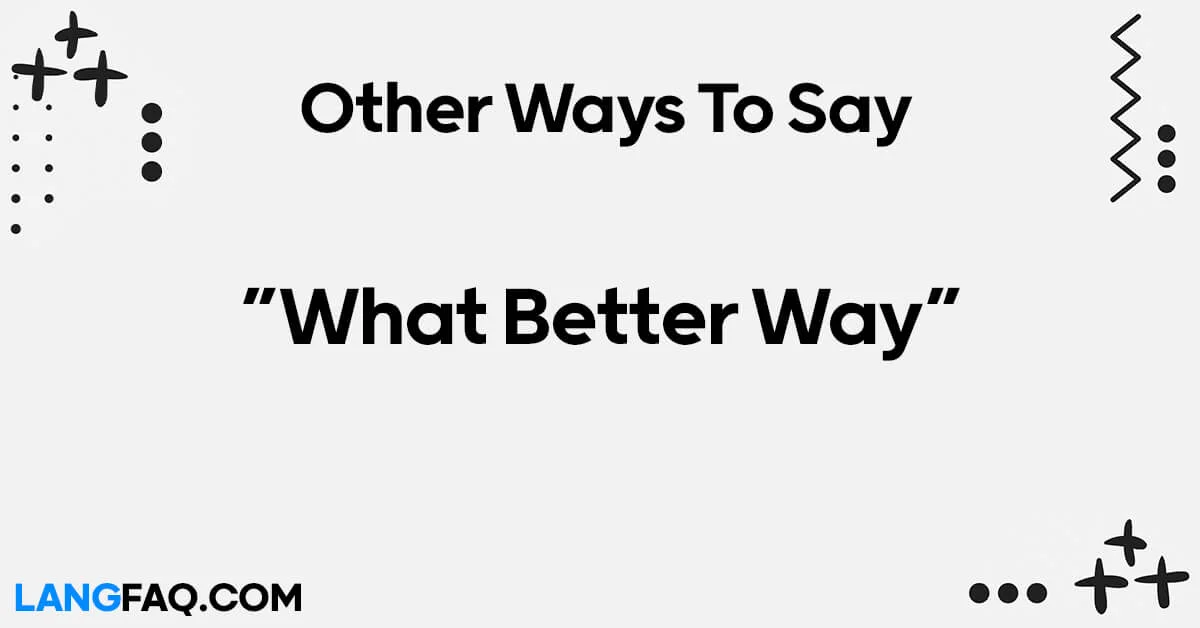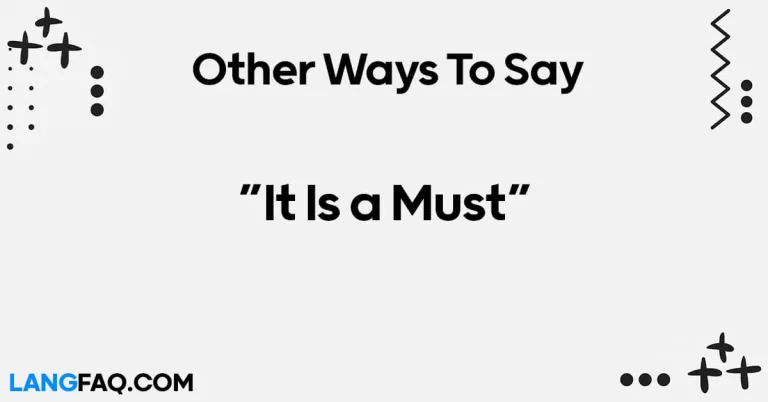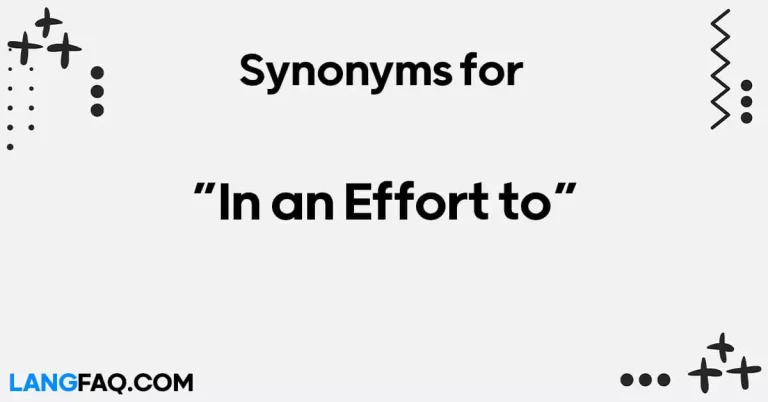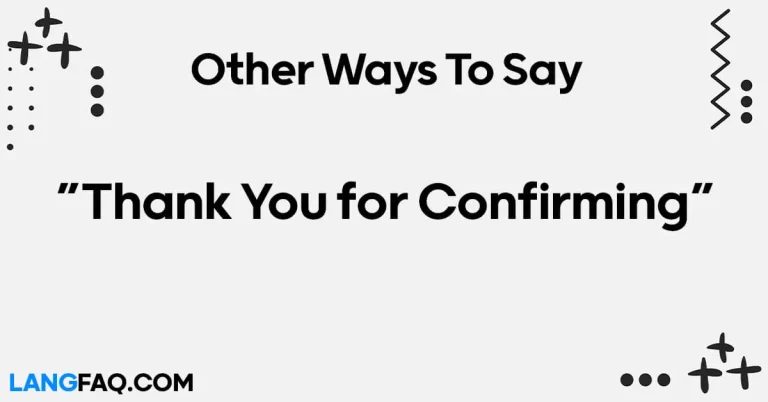In our language, variety is the spice that adds flavor to communication. When it comes to expressing ideas or seeking opinions, the phrase “What Better Way?” might feel overused. Fear not! We’ve curated 12 captivating alternatives that will invigorate your speech and writing. Let’s dive into the world of linguistic diversity!
12 Other Ways to Say “What Better Way”
Here are 12 alternatives to “What Better Way”:
- How Can We Improve Upon
- Is There a More Effective Method
- What Superior Approach Could We Take
- Could We Enhance This By
- Is There a More Optimal Solution
- How Can We Elevate This To
- Is There a Superior Alternative To
- Could We Optimize This Further With
- What’s the Ultimate Way To
- Is There a More Superior Route
- How Can We Maximize
- Is There a More Ideal Approach
Here’s the table with the meaning and examples of the alternatives to “What Better Way”:
| Alternative | Meaning | Example |
|---|---|---|
| How Can We Improve Upon | Inquire about enhancing something | How can we improve upon our customer service? |
| Is There a More Effective Method | Questioning for a better way to achieve results | Is there a more effective method for project management? |
| What Superior Approach Could We Take | Exploring for a better strategy or plan | What superior approach could we take to increase sales? |
| Could We Enhance This By | Considering ways to make something better | Could we enhance this by adding more features? |
| Is There a More Optimal Solution | Seeking the best possible answer or resolution | Is there a more optimal solution to this problem? |
| How Can We Elevate This To | Discussing raising something to a higher level | How can we elevate this to meet our standards? |
| Is There a Superior Alternative To | Asking if there’s a better option available | Is there a superior alternative to this product? |
| Could We Optimize This Further With | Exploring additional ways to make something more efficient | Could we optimize this further with automation? |
| What’s the Ultimate Way To | Inquire about the best method or approach | What’s the ultimate way to achieve success? |
| Is There a More Superior Route | Questioning if there’s a better path to take | Is there a more superior route to our destination? |
| How Can We Maximize | Discussing ways to maximize potential | How can we maximize our productivity? |
| Is There a More Ideal Approach | Asking if there’s a better or perfect method | Is there a more ideal approach to solving this issue? |
Exploring alternatives to “What Better Way” offers a rich array of expressions, each tailored to inquire, enhance, or optimize various aspects of our endeavors. By incorporating these alternatives into our communication, we can enrich our language and convey our intentions with clarity and precision.
Is It Correct to Say “What Better Way”?
Yes, “What better way” is a correct phrase in English. It is often used to suggest that there may be a more effective or preferable method or approach to accomplish a task or achieve a goal. This phrase is typically used when seeking alternatives or improvements.
For example, you might say:
“What better way to start the day than with a cup of coffee?”
This implies that starting the day with a cup of coffee is considered an effective or enjoyable way to begin the day, but it leaves open the possibility that there may be other, even better ways to start the day.
Overall, “What better way” is a grammatically correct and commonly used phrase in English to express the idea of seeking superior alternatives or solutions.
Professional Mail Example With “What Better Way”
Subject: Seeking Input for Process Improvement
Dear [Recipient’s Name],
I hope this email finds you well. As we continue our efforts to enhance our department’s efficiency and effectiveness, I wanted to reach out to you for your valuable insights.
Given your expertise in [specific area or project], I believe your input would be instrumental in our pursuit of continuous improvement. With that in mind, I would like to pose the question: What better way can we optimize our current processes to achieve our goals more efficiently?
Your perspective on potential enhancements or refinements to our workflows, procedures, or systems would be greatly appreciated. Whether it’s streamlining communication channels, implementing new tools or technologies, or revisiting our project management strategies, your suggestions will help guide our efforts towards greater success.
Please feel free to share your thoughts, ideas, or any best practices you may have observed or implemented in similar contexts. Your contributions will be invaluable as we strive to elevate our performance and deliver exceptional results.
Thank you in advance for your collaboration and commitment to excellence. I look forward to hearing from you and discussing further how we can work together to drive positive change within our department.
Best regards,
[Your Name] [Your Position] [Your Contact Information]
How Can We Improve Upon
Meaning: When using the phrase “How Can We Improve Upon,” you’re asking for ways to enhance or make something better. It suggests a proactive approach to refining processes, products, or services.
Formal Context: In a professional setting, such as a business meeting or performance review, this phrase can be used to encourage constructive feedback and brainstorming for improvement.
Informal Context: Among friends or colleagues collaborating on a project, this phrase fosters open communication and a shared goal of continuous improvement.
Example: Formal: “In our quarterly review, let’s discuss how we can improve upon our customer satisfaction ratings.”
Informal: “We’ve received some feedback on our presentation. How can we improve upon it for the next meeting?”
Variations:
- Colleagues: “How can we enhance our teamwork?”
- Friends: “How can we make our movie nights even better?”
Email Sample:
Subject: Seeking Input for Continuous Improvement
Dear Team,
As we approach the end of the quarter, I’d like to gather your insights on how we can improve upon our current project strategies. Your valuable input will help us refine our approach and achieve even greater success. Please come prepared to share your ideas during our next team meeting.
Best regards, [Your Name]
Is There a More Effective Method
Meaning: “Is There a More Effective Method” prompts a discussion about alternative approaches or techniques that might yield better results or outcomes.
Formal Context: This phrase is commonly used in professional settings when evaluating processes, procedures, or problem-solving methods.
Informal Context: Among friends or in casual discussions, this phrase can be used to explore better ways to accomplish tasks or achieve goals.
Example: Formal: “Our current marketing strategy isn’t yielding the expected results. Is there a more effective method we could consider?”
Informal: “We’ve been trying to plan this trip for weeks. Is there a more effective method for coordinating everyone’s schedules?”
Variations:
- Colleagues: “Do you think there’s a more efficient way to handle our weekly meetings?”
- Friends: “Could there be a better way to organize our game nights?”
Email Sample:
Subject: Seeking Input for Improved Processes
Dear Team, As we continue to strive for excellence in our operations, I’d like to invite you to share any thoughts or suggestions on whether there’s a more effective method we could adopt for our project management approach. Your insights are invaluable in our pursuit of efficiency and success.
Looking forward to hearing your ideas, [Your Name]
What Superior Approach Could We Take
Meaning: “What Superior Approach Could We Take” invites exploration of higher-quality or more advanced methods or strategies.
Formal Context: This phrase is suitable for professional discussions, particularly when seeking innovative solutions or approaches to complex problems.
Informal Context: In casual conversations or brainstorming sessions, this phrase encourages creativity and out-of-the-box thinking.
Example: Formal: “As we face increased competition in the market, what superior approach could we take to differentiate our product?”
Informal: “Planning our annual charity event, what superior approach could we take to maximize donations and impact?”
Variations:
- Colleagues: “Do you have any ideas for a superior approach to client presentations?”
- Friends: “What’s a superior approach to planning our weekend getaway?”
Email Sample:
Subject: Seeking Innovative Solutions
Dear Team,
As we navigate new challenges and opportunities in our industry, I’m eager to hear your thoughts on what superior approach we could take to address emerging trends and exceed customer expectations. Your creativity and expertise will drive our continued success.
Warm regards, [Your Name]
Could We Enhance This By
Meaning: “Could We Enhance This By” suggests exploring ways to improve or augment something to make it more effective or appealing.
Formal Context: This phrase is suitable for professional discussions, particularly when seeking enhancements to products, services, or processes.
Informal Context: In casual conversations or collaborative settings, this phrase encourages brainstorming and creative problem-solving.
Example: Formal: “Our website’s user experience could be improved. Could we enhance this by simplifying the navigation?”
Informal: “Our dinner party menu needs a little something extra. Could we enhance this by adding a signature cocktail?”
Variations:
- Colleagues: “Could we enhance our quarterly reports by including more visual data representations?”
- Friends: “Could we enhance our hiking trip by planning a picnic at the summit?”
Email Sample:
Subject: Seeking Input for Website Enhancement
Dear Team,
I’m reaching out to gather your insights on how we could enhance our website to better meet the needs of our users. Your suggestions on potential improvements or additions would be greatly appreciated as we strive to deliver an exceptional online experience.
Thank you for your collaboration, [Your Name]
Is There a More Optimal Solution
Meaning: “Is There a More Optimal Solution” prompts consideration of the best or most efficient solution to a problem or challenge.
Formal Context: This phrase is commonly used in professional settings, such as business meetings or project discussions, when evaluating strategies or approaches.
Informal Context: Among friends or in casual discussions, this phrase can be used to brainstorm solutions to everyday problems or decisions.
Example: Formal: “Our current shipping process is time-consuming. Is there a more optimal solution that can streamline operations?”
Informal: “We’re trying to plan our vacation itinerary. Is there a more optimal solution for maximizing our time and experiences?”
Variations:
- Colleagues: “Is there a more optimal solution for allocating resources in our department?”
- Friends: “Do you think there’s a more optimal solution for organizing our game night schedule?”
Email Sample:
Subject: Seeking Input for Process Improvement
Dear Team,
As we strive for continuous improvement in our operations, I’m interested in hearing your perspectives on whether there’s a more optimal solution for addressing our current challenges. Your insights will be instrumental in enhancing our efficiency and effectiveness.
Warm regards, [Your Name]
How Can We Elevate This To
Meaning: “How Can We Elevate This To” suggests raising something to a higher standard or level of excellence.
Formal Context: This phrase is suitable for professional discussions, particularly when seeking to improve the quality or impact of a project or initiative.
Informal Context: In casual conversations or collaborative settings, this phrase encourages aiming for higher achievements or aspirations.
Example: Formal: “Our customer service standards could be elevated. How can we elevate this to deliver an exceptional experience?”
Informal: “We’ve been volunteering at the local shelter. How can we elevate this to make an even greater impact on the community?”
Variations:
- Colleagues: “How can we elevate our team performance to meet the company’s expectations?”
- Friends: “How can we elevate our weekly game nights to make them more memorable?”
Email Sample:
Subject: Seeking Ideas for Excellence
Dear Team,
As we pursue excellence in our endeavors, I’m eager to hear your suggestions on how we can elevate our current initiatives to new heights. Your creativity and dedication will contribute to our collective success.
Best regards, [Your Name]
Is There a Superior Alternative To
Meaning: “Is There a Superior Alternative To” prompts exploration of better or more advantageous options or choices.
Formal Context: This phrase is commonly used in professional settings, such as decision-making meetings or product evaluations.
Informal Context: Among friends or in casual discussions, this phrase can be used to consider alternative plans or activities.
Example: Formal: “Our current supplier is reliable, but is there a superior alternative to consider that offers better quality or pricing?”
Informal: “We’re brainstorming weekend plans. Is there a superior alternative to our usual movie night?”
Variations:
- Colleagues: “Is there a superior alternative to our current project management software?”
- Friends: “Is there a superior alternative to our usual hangout spot?”
Email Sample:
Subject: Seeking Input for Decision-Making
Dear Team,
As we evaluate our options for [specific decision or choice], I’m interested in hearing your thoughts on whether there’s a superior alternative that we haven’t considered. Your insights will inform our decision-making process and help us choose the best path forward.
Warm regards, [Your Name]
Could We Optimize This Further With
Meaning: “Could We Optimize This Further With” suggests exploring additional ways to make something more efficient or effective.
Formal Context: This phrase is suitable for professional discussions, particularly when seeking to maximize productivity or streamline processes.
Informal Context: In casual conversations or collaborative settings, this phrase encourages brainstorming and creative problem-solving.
Example: Formal: “Our current marketing campaign is performing well, but could we optimize this further with targeted segmentation?”
Informal: “We’ve organized our workspace, but could we optimize this further with better storage solutions?”
Variations:
- Colleagues: “Could we optimize our workflow further with automation tools?”
- Friends: “Could we optimize our weekly meal planning further with meal prep strategies?”
Email Sample:
Subject: Seeking Input for Process Optimization
Dear Team,
As we strive for continuous improvement in our operations, I’m reaching out to gather your insights on whether we could optimize our current processes further. Your suggestions on additional enhancements or efficiencies would be greatly appreciated as we work towards our goals.
Thank you for your contributions, [Your Name]
What’s the Ultimate Way To
Meaning: “What’s the Ultimate Way To” prompts exploration of the best or most ideal method or approach to achieve a desired outcome.
Formal Context: This phrase is commonly used in professional settings, such as strategic planning sessions or goal-setting discussions.
Informal Context: Among friends or in casual discussions, this phrase can be used to brainstorm the most enjoyable or effective ways to accomplish tasks or goals.
Example: Formal: “As we launch our new product line, what’s the ultimate way to maximize market penetration and sales?”
Informal: “We’re planning a surprise party. What’s the ultimate way to keep the guest of honor in the dark until the last minute?”
Variations:
- Colleagues: “What’s the ultimate way to improve employee morale and engagement?”
- Friends: “What’s the ultimate way to make our road trip unforgettable?”
Email Sample:
Subject: Seeking Ideas for Optimal Results
Dear Team,
As we set our sights on achieving [specific goal or objective], I’m interested in hearing your thoughts on what’s the ultimate way to ensure success. Your creative ideas and strategic insights will guide our efforts towards optimal results.
Best regards, [Your Name]
Is There a More Superior Route
Meaning: “Is There a More Superior Route” prompts consideration of alternative paths or approaches that may offer better outcomes or advantages.
Formal Context: This phrase is suitable for professional discussions, particularly when evaluating strategic plans or project timelines.
Informal Context: In casual conversations or travel planning, this phrase encourages exploring alternative routes or methods.
Example: Formal: “Our current logistics plan is efficient, but is there a more superior route that could minimize transportation costs?”
Informal: “We’ve been taking the same route to work every day. Is there a more superior route that could save time or avoid traffic?”
Variations:
- Colleagues: “Is there a more superior route to completing our project ahead of schedule?”
- Friends: “Is there a more superior route to our favorite hiking spot that offers better views?”
Email Sample:
Subject: Seeking Input for Strategic Planning
Dear Team,
As we review our project timeline and objectives, I’m interested in hearing your perspectives on whether there’s a more superior route we could take to achieve our goals. Your insights will inform our decision-making process and help us navigate towards success.
Warm regards, [Your Name]
How Can We Maximize
Meaning: “How Can We Maximize” prompts consideration of ways to optimize or make the most of a situation, resource, or opportunity.
Formal Context: This phrase is commonly used in professional settings, such as strategic planning meetings or resource allocation discussions.
Informal Context: Among friends or in casual discussions, this phrase can be used to brainstorm ways to make the most out of experiences or activities.
Example: Formal: “As we allocate our budget for the upcoming quarter, how can we maximize our ROI?”
Informal: “We’re planning our weekend getaway. How can we maximize our fun without breaking the bank?”
Variations:
- Colleagues: “How can we maximize our team’s productivity without increasing workload?”
- Friends: “How can we maximize our enjoyment at the concert tonight?”
Email Sample:
Subject: Seeking Input for Resource Optimization
Dear Team,
As we evaluate our resources and objectives for the next quarter, I’m interested in hearing your ideas on how we can maximize our efforts for optimal results. Your input will be instrumental in driving our success.
Best regards, [Your Name]
Is There a More Ideal Approach
Meaning: “Is There a More Ideal Approach” prompts consideration of alternative methods or strategies that may be better suited to achieve desired outcomes.
Formal Context: This phrase is suitable for professional discussions, particularly when evaluating project plans or problem-solving approaches.
Informal Context: In casual conversations or decision-making processes, this phrase encourages exploring the most suitable or preferable approach.
Example: Formal: “Our current recruitment process is effective, but is there a more ideal approach that could attract top talent?”
Informal: “We’ve been trying to organize our closet. Is there a more ideal approach that could help us stay organized long-term?”
Variations:
- Colleagues: “Is there a more ideal approach to resolving conflicts within the team?”
- Friends: “Is there a more ideal approach to planning our friend’s surprise birthday party?”
Email Sample:
Subject: Seeking Input for Problem-Solving
Dear Team,
As we address [specific challenge or issue], I’m interested in hearing your perspectives on whether there’s a more ideal approach we could take to achieve our desired outcomes. Your creativity and collaboration will guide our path forward.
Warm regards, [Your Name]
FAQs
Q: Can these alternatives be used interchangeably with “What Better Way”? Yes, these alternatives offer versatility in expression and can effectively replace “What Better Way” in various contexts.
Q: Are there specific situations where certain alternatives are more appropriate? Certainly! Each alternative carries its own nuance, so choose based on the tone and emphasis you wish to convey.
Q: How can I incorporate these alternatives into my writing? Experiment with different alternatives to add variety and depth to your language. Consider the context and desired impact when selecting the most suitable phrase.
Q: Are there cultural considerations when using these alternatives? While these phrases are generally applicable, it’s essential to be mindful of cultural nuances and appropriateness in specific contexts.
Q: Can I create my own alternatives using similar structures? Absolutely! Feel free to get creative and craft your own alternatives inspired by the structures and meanings of these phrases.
Q: Where can I find more examples of alternative expressions? Explore literature, language resources, and online platforms for additional inspiration and examples of diverse expressions.
Conclusion
Language is a dynamic tool that evolves with creativity and usage. By incorporating these 12 alternatives into your vocabulary, you’ll enrich your expression and engage your audience with freshness and variety. Embrace the beauty of linguistic diversity and elevate your communication to new heights!







